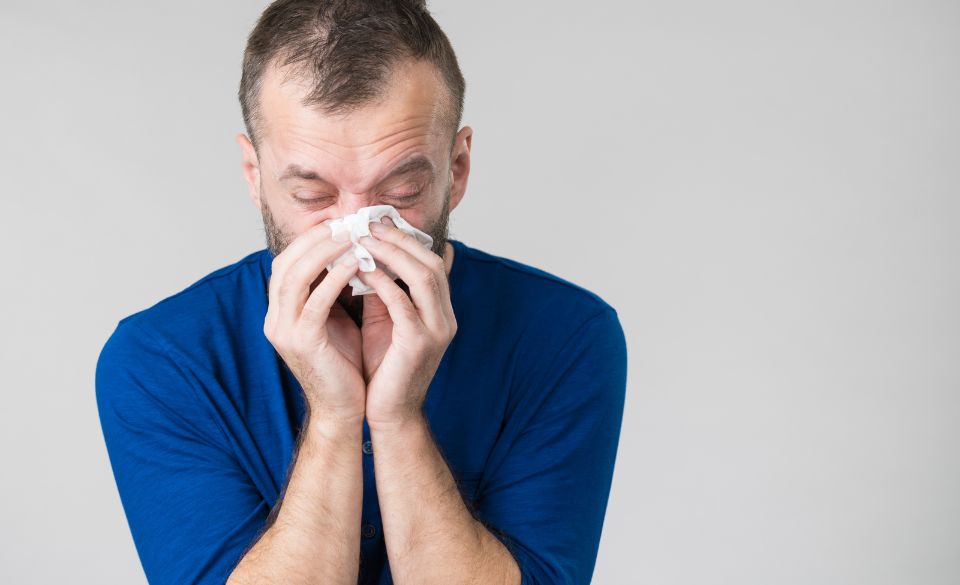
Why Does My Nose Run When I Exercise – A Complete Guide
Page Contents
If you’ve ever experienced a runny nose while working out, you’re not alone. It can be frustrating and distracting, but don’t worry, there are ways to prevent it from happening. In this article, we’ll explore why your nose runs when you exercise and how you can stop it.
Why Does My Nose Run When I Exercise
When you exercise, your body has to work harder to keep up with the demands being placed on it. One of the ways your body reacts to this is by increasing the production of mucus in your nose. This is because the air you breathe in during exercise is usually drier and colder, which can irritate the lining of your nose and cause it to produce more mucus.
In addition to increased mucus production, exercise can also trigger the release of histamines in your body. Histamines are chemicals that your immune system releases in response to allergens, such as pollen or dust. They cause your blood vessels to dilate and your nasal passages to become inflamed, leading to congestion and a runny nose.
Several studies have explored the link between exercise and nasal symptoms. One study published in the Journal of Allergy and Clinical Immunology found that exercise-induced rhinitis, or a runny nose caused by exercise, is a common problem among athletes. The study found that over 60% of athletes experienced nasal symptoms during or after exercise, and that the severity of symptoms increased with the intensity of the exercise.
Another study published in the Journal of Sports Science and Medicine found that exercise-induced rhinitis was more common in people with seasonal allergies. The study found that individuals with seasonal allergies were more likely to experience nasal symptoms during exercise, and that these symptoms were more severe during peak allergy season.
While exercise-induced rhinitis can be uncomfortable, there are ways to manage it. As mentioned earlier, staying hydrated, using a nasal spray, wearing a face mask, and taking antihistamines can all be effective ways to prevent a runny nose while exercising. Additionally, it may be helpful to avoid exercising outdoors during peak allergy season or on days when pollen counts are high.
How Do You Stop A Runny Nose When Exercising?
A runny nose during exercise can be an uncomfortable and distracting experience, but there are several strategies you can use to manage the symptoms and prevent them from interfering with your workout. Here are some tips for stopping a runny nose when exercising:
Stay hydrated: Drinking plenty of water before, during, and after exercise can help keep your nasal passages moist and prevent excess mucus production.
Use a nasal spray: Over-the-counter nasal sprays, such as saline sprays, can help soothe irritated nasal passages and reduce congestion. Be sure to follow the instructions carefully and avoid overuse.
Wear a face mask: Wearing a face mask while exercising can help filter out allergens and other irritants from the air, which can help reduce nasal symptoms.
Take antihistamines: If you have seasonal allergies or exercise-induced rhinitis, taking an antihistamine before exercise can help reduce inflammation and prevent nasal symptoms.
Adjust your exercise routine: If your nasal symptoms are particularly bothersome, consider adjusting your exercise routine. For example, you may want to exercise indoors or during times when pollen counts are low.
Try breathing exercises: Deep breathing exercises, such as diaphragmatic breathing, can help open up your nasal passages and improve airflow.
Consult a doctor: If your nasal symptoms persist despite these measures, or if you experience other symptoms such as wheezing or coughing, it’s important to consult a doctor. They can help identify the underlying cause of your symptoms and recommend appropriate treatment.
In summary, a runny nose during exercise can be caused by several factors, including increased mucus production and the release of histamines. By staying hydrated, using a nasal spray, wearing a face mask, taking antihistamines, adjusting your exercise routine, trying breathing exercises, and consulting a doctor if necessary, you can manage your symptoms and continue to exercise comfortably.
Conclusion
A runny nose while exercising can be annoying, but it’s a common occurrence that can be prevented. Staying hydrated, using a nasal spray, wearing a face mask, and taking antihistamines can all be effective ways to prevent a runny nose while exercising. Remember to always listen to your body and consult with a healthcare professional if you have any concerns. With these tips, you can stay focused on your workout and achieve your fitness goals without any distractions.


